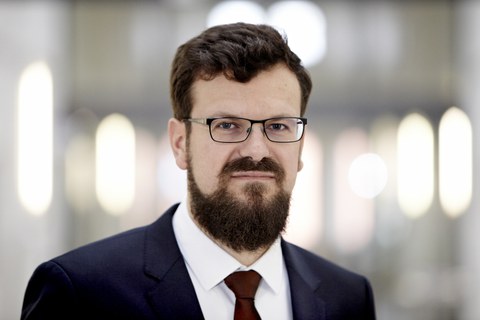Economics

© Klaus Gigga

© Klaus Gigga

© Klaus Gigga
Table of contents
Full Chairs
Chair of Economics, esp. Public Economics
Prof. Dr. Marcel Thum
Information on Teaching
The state plays a governing role in our society interfering with economic activity through taxation, public debt and public expenditures. This makes an impact on the life of every consumer, employee, saver, creditor, employer and entrepreneur. Therefore, it is important to lead substantiated discussions about the appropriate extent and form of public influence on economy and society. Using economic instruments, public finance is the study of all shapes of state activity. In the Bachelor's curriculum, we offer introductory courses on economics as well as courses on the justification of government activity and economic theory of politics. In the Master's program, courses on tax theory, welfare state theory, resource economics and international public economics are offered.
Research Focus
- Fiscal Federalism
- Regulation
- Political Economy
- Corruption
- Labor Market
- Environmental Economics
Chair of Economics, esp. International Monetary Economics
Prof. Dr. Stefan Eichler
Information on Teaching
The field of international monetary economics is of highest relevance due to the large interdependencies between the financial sector and the real economy, the challenge of maintaining financial stability, as well as the numerous initiatives of regulating the financial sector. Our teaching deals with these issues building on theoretical and empirical models. Students are encouraged to derive economic policy advice, to consult up to date research papers, and to evaluate the models using real world data. In the Bachelors curriculum, we offer courses on fundamentals of macroeconomics; money, banking and financial markets; and monetary policy. In the Masters curriculum, we offer courses on exchange rates, international financial markets, and seminars on financial crises as well as international monetary economics.
Research Focus
- Currency risk and the pricing of American Depositary Receipts
- Political risk and the pricing and asset allocation of sovereign bonds
- Market based models of bank default risk
- Central transparency and international investment
- Voting behavior in monetary policy committees
Chair of Economics, esp. International Economics
Prof. Dr. Christian Leßmann
Information on Teaching
International economics are a central field of economics. Modern economies are closely connected: they specialize in certain industries and trade goods and services. Production factors are increasingly mobile across national borders. Today, we observe large amounts of foreign direct investment, international mergers and acquisitions, and migration. Rich countries support poor countries via development aid, and migrants pay large amounts of remittances to those who stayed at home. Within states, some regions benefit more from globalization than others, which creates economic inequalities. International Economics examines all these aspects and the role of the state or international organizations.
Research Focus
- International Economics
- Development Economics
- Regional Economics
- Environmental Economics
- Public Economics
Junior Professorship for Economics, in particular International Economic Policy
Jun.Prof. Dr. Valentin Lindlacher
Information on Teaching
Our courses deal with empirical and theoretical development economics and georeferenced or spatial data in applied economic research. The lecture "Microeconomic Theories in Development Economics" considers the role of different types of capital (human, physical, financial, and social capital) and discusses coordination failures, models of asymmetric information, and simple behavioral models. The lecture "Introduction to Geographic Information Systems" teaches the application of Geographic Information Systems software in economics and is particularly designed to prepare students to use it independently in their master's thesis. Finally, the seminar "Current Topics in Empirical Economic Research" offers students a look at current research in the field of empirical economic research, with a focus on regional economics, development economics, and new data and methods.
Research Focus
- Research Fields: Political Economy, Regional Economics, Development Economics
- Research Topics: Electoral Turnout, Digital Infrastructure, Local Economic Growth
Chair of Quantitative Methods, esp. Econometrics
Prof. Dr. Kamila Cygan-Rehm
Quantitative methods and data analysis play a key role in business, science, politics, and society. Thus, data literacy and programming skills are key competencies in the job market. A sound understanding of empirical relationships and the ability to independently design and conduct appropriate analyses are therefore central skills that a modern degree program should impart.
The Chair’s teaching focuses on modern empirical methods and special courses in the field of applied econometrics.
Our research is primarily in the areas of empirical labor economics, economics of education, health economics, and population economics, as well as at their intersections with other social science disciplines. The main focus is on the econometric evaluation of policy measures.
Chair of Quantitative Methods, esp. Econometrics
Prof. Dr. Bernhard Schipp
Information on Teaching
Econometric analysis intends to evaluate economic models from a theoretical and empirical point of view. Its ultimate target consists of forecasting.
This is possible if stable structural cause-effect relationships have been detected in past observations. Students shall be enabled to specify, analyze and interpret econometric models appropriately based on economic theories. Students shall be able to work with econometric models for time series, cross-sectional, and panel data. A further educational objective is to qualify students to estimate the models with suitable software. During the Bachelor’s studies, students can participate in the lectures "Basic of Econometrics" and "Specialization of Econometrics". These lectures deal with linear regression models. In the following Master’s studies, students can amplify their econometric competencies by participating in the lectures "Microeconometrics" and "Time Series Econometrics".
Research Focus
- Credit Rating Assessing
- High Frequence Time Series
Chair of Econometrics and Statistics, esp. in Transportation (Faculty of Transport and Traffic Sciences "Friedrich List", co-opted)
Prof. Dr. Ostap Okhrin
Chair of Economics, esp. Environmental, Urban and Regional Economics
(joint Chair with the IOER)
Prof. Dr. Artem Korzhenevych
Chair of Economics, esp. Transport Policy and Spatial Economics (Faculty of Transport and Traffic Sciences "Friedrich List", co-opted)
Prof. Dr. Georg Hirte
Chair of Economics, esp. Economic Policy and Economic Research
Prof. Dr. Alexander Kemnitz
Information on Teaching
Our courses explore economic policy issues on a sound microeconomic foundation. Generally, we build on price, competition, and game theory, which we also teach in the first-year module "Strategy and Competition." Our bachelor courses "Introduction to Economic Growth" and "Economic Inequality" draw on these theories to analyze the determinants of the level and distribution of income. At the Master's level, we deepen the issues raised at the Bachelor's level in various application contexts, currently in "Economics of Education" and "Economics of Migration." Moreover, our bachelor's and master's seminars scrutinize recent economic policy debates.
Research Focus
- Economics of the Welfare state (including Education Economics, Labour Markets, Old-age Security, Family Policy)
- Growth Theory
- Demography and Migration
- Industrial Economics
- Political Economy
Extraordinary and honorary professors
Extraordinary Professor of Economics, esp. Financial Policy
Prof. Dr. Georg Milbradt
Honorary Professor of Economics, esp. Financial Market Stability
Prof. Dr. Thilo Liebig
Honorary Professor of Economics, esp. Economics of Structural Change
Prof. Dr. Joachim Ragnitz
Retired professors
Prof. Dr. Udo Broll ( † 2025)
Prof. Dr. Marco Lehmann-Waffenschmidt
Prof. Dr. Bernhard Wieland (Faculty of Transport and Traffic Sciences "Friedrich List", co-opted)













